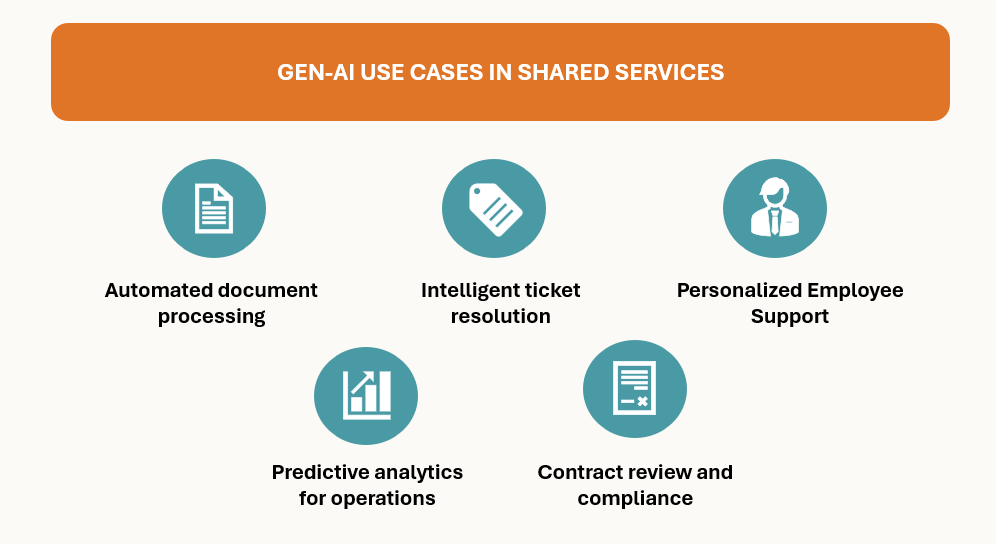Exciting Applications Of GenAI In The Success Of Shared Services
Published on
Traditionally, shared services were centered around labor-intensive, error-prone tasks. Today, as the mandate to drive greater business value grows, industries are rapidly adopting artificial intelligence to transform these functions into engines of efficiency, insight, and innovation. Gartner predicts that over 70% of organizations will shift their focus to GenAI shared services by 2025, which may increase their efficiency by up to 40%.
When it comes to tasks that are repetitive and can be standardized, AI automation acts as a transformative lever, reshaping the delivery of services. These new technologies are encouraging organizations to relook at the traditional channels that have defined shared services over the years.
GenAI Use Cases in Shared Services
Shared service models have already witnessed the advent of this transformative technology, which is rapidly shifting from conceptual discussions to practical applications. GenAI shared services are now revolutionizing their operational model, from automation of routine tasks to more informed decision-making.

- Automated Document Processing: The sheer number of documents in shared services, including invoices, forms, HR records, contracts, etc., and their processing can pose a challenge. Manual processing of these documents can be time-consuming and prone to human errors.
Generative AI proves to be a strategic solution by automating document-related workflows. This also ensures that an organization can divert valuable human resources to more strategic initiatives.
- Intelligent Ticket Resolution: By incorporating this Gen AI into their service desks, companies can leverage automated yet conversational ticket resolution. It identifies patterns and suggests solutions based on the historical records of the previous cases, enabling streamlined and quicker ticket closure. This reduces the workload of IT support teams and enhances their overall efficiency.
- Personalized Employee Support: Gen AI elevates the employee experience by delivering personalized support based on individual profiles and past interactions. By tailoring responses and solutions to each employee’s unique context, it fosters a sense of being valued and understood—ultimately boosting satisfaction and well-being.
- Predictive Analytics for Operations: Shared services analytics provide deeper insights into operations, allowing companies to make more informed decisions. GenAI helps organizations create complex data models that enable them to predict issues even before they arise and manage them proactively.
As per Forrester Research, companies utilizing shared services analytics witness an improvement of 20% in the accuracy relating to decision-making.
- Contract Review and Compliance: Organizations can also use Generative AI for legal research and drafting of contracts. For instance, shared service organizations can train generative AI on past contracts to help it gain an understanding of the relevant clauses. This can save a legal team’s time and effort, allowing them to focus on more complex issues.
Implementation Challenges
Despite the numerous benefits that it offers, implementing this cutting-edge technology in the shared service model comes with unique challenges. To maximize the return on investment, leaders may look to focus on the following obstacles:
- Ensuring Data Quality and Management: Data is the backbone for any AI automation system. Poor quality of data can lead to inconsistent and inaccurate outputs, leading to diminished effectiveness of GenAI systems. This makes it crucial for organizations to invest in robust data management programs.
- Integrating with Legacy Systems: GenAI’s seamless integration with the existing IT infrastructure is also critical. Hence, companies need to assess their technological environment and plan the integration accordingly. They can ensure a smooth transition by ensuring collaboration between AI and IT teams.
- Ensuring Compliance with Ethical Use: To uphold ethical standards and ensure compliance, organizations must take deliberate steps—starting with establishing an AI ethics board to oversee responsible development and deployment. In addition, regular audits are essential to verify adherence to relevant laws, regulations, and internal policies.
- Mitigating Bias or Discrimination: Bias and fairness are critical concerns in generative AI, as these models can inadvertently inherit—and even amplify—biases embedded in training data, leading to unfair or discriminatory outcomes.
To address this, organizations must proactively detect and mitigate bias from the outset. This means training models on diverse, representative datasets and continuously monitoring outputs to ensure fairness, equity, and accountability throughout the AI lifecycle.
Upskilling for GenAI
Upskilling trains a workforce in how to fully apply and use the latest technologies, thus, allowing an organization to make the most out of them. The need for upskilling in GenAI is so imminent that 45% of CEOs in a PwC survey believe that their companies will not be viable in the next 10 years if they do not include technology-based skills like GenAI.
Organizations need to invest in training programs that equip the shared service workforce with AI capabilities, prompt engineering, data interpretation, and more. Another crucial aspect is developing a robust change management strategy that supports the adoption of GenAI shared services and addresses employee concerns about it.
Future Outlook
Forward-thinking shared service organizations are already integrating GenAI systems in their technological infrastructure to streamline various functions. These systems have positive implications on everything, ranging from IT support to providing solutions for HR inquiries. They also free up human resources for more strategic work. An IDC report highlights that enterprises that utilize AI systems have witnessed a reduction of 25% in response times.
As GenAI continues to evolve, its integration into the shared services model is no longer optional. As per PwC, AI adoption, along with GenAI, can contribute up to $15.7 trillion to the global economy by 2030. Companies that will leverage this cutting-edge technology will achieve significant operational improvements and unlock new avenues of sustainable growth.
To see how your company can benefit from a shared services model equipped with a workforce that is AI-ready, contact us. ANSR’s advisory, talent, workspace and business enabler services have already boosted innovation while reducing costs for a range of high-growth enterprises. Contact our team to see how we can help your business.




